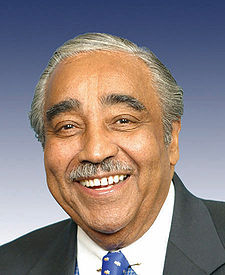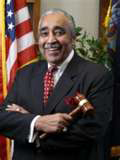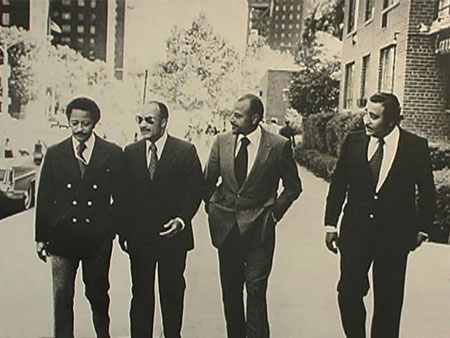
Representative Charles Rangel

Chairman Rangel

The Gang of Four (L to R – Dinkins, Paterson, Sutton, Rangel)Â
                                                                        Â
Legends
By Yussuf J. Simmonds
Â
Â
Charles Rangel
“He’s been in the U.S. Congress for 38 years and was one of the original members of the Congressional Black Caucusâ€
As one who has been a Member of the U.S. House of Representatives for almost four decades – since January 1971 – Charles Rangel has experienced many “firstsâ€; He is the first African American to become the chairman of the powerful House Ways and Means Committee, an enviable position from the Right and the Left; he was elevated to that position in January 2007. He represents New York’s 15th Congressional District, which includes Harlem and Upper Manhattan, and is the senior member of the New York congressional delegation.
Born Charles Bernard Rangel in June 1930, in New York City, to Ralph Rangel, Sr. and Blanche M. Wharton, he is one of the founding members of the Congressional Black Caucus (CBC). He has been its chairman and a continuous member of the caucus. Rangel served in the New York Assembly for four years (2 two-year terms), prior to coming to Congress; he had defeated veteran Harlem congressman, Adam Clayton Powell. His first congressional committee assignment was on the House Judiciary Committee during the impeachment hearings of then President Richard Nixon.
Though Rangel was an above average student and attended DeWitt Clinton High School, he dropped out at 16 and opted to do various low level jobs including selling shoes. A major turning point in his life came when he enlisted in the U.S. Military and throughout his time in the service during the Korean War. He served in the army for four years in the 2nd Infantry Division of the all-black 503rd Field Artillery Battalion, attaining the rank of sergeant. He was awarded a Purple Heart and the Bronze Star with Valor for his actions in the face of death, and also the Presidential Unit Citation, the Republic of Korea Presidential Unit Citation, and three battle stars. After an honorable discharge in 1952, Rangel returned home and resumed his education. He completed his Bachelor’s degree from New York University in 1957 where he made the dean’s list and obtained a full scholarship. Three years later he earned a law degree in 1960 from St. John’s University School of Law.
During the 1950s, Rangel met Alma Carter, a social worker, in Harlem; they were married in 1964 and had two children: Steven and Alicia.
After passing the New York State Bar, Rangel was hired by Weaver, Evans & Wingate, the city’s most prominent Black law firm. And though he did not make much money in private practice, he earned a positive reputation for providing legal assistance to Black civil rights activists during the Civil Rights Era. In 1961, Rangel was appointed to the U.S. Attorney’s office in the Southern District of New York by then U.S. Attorney General, Robert F. Kennedy as an assistant to U.S. Attorney Robert Morgenthau, a position he maintained for a year. That was followed by four subsequent appointments which began his interest in politics; they were: legal counsel to the N.Y. Housing and Redevelopment; associate counsel to the Speaker of the N.Y. State Assembly; law clerk to Judge James L. Watson; and general counsel to the National Advisory Commission on Selective Service.
His interest in politics grew with these roles and in 1963, he ran unsuccessfully for Democratic Party District Leader during an intense factional dispute in Harlem among the party’s faithfuls. A year later, Rangel formed a relationship with one of the most powerful Black businessmen in New York, Assemblyman Percy Sutton who became his political mentor. Together they co-founded the John F. Kennedy Democratic Club in Harlem, which was later renamed the Rev. Martin Luther King, Jr. Democratic Club. (Later on, Rangel and Sutton formed an alliance with Basil Paterson and David Dinkins – who became the city’s first Black mayor – and they became known as “the Gang of Four†emerging as the city’s most powerful Black politicians).
The formation of the Democratic Club generated a closer relation with the civil rights community in addition to the legal services that he had already been providing. In 1965, Rangel took part in the now famous Selma to Montgomery marches. What had began as a brief appearance mushroomed into days of marching. These experiences, and his desire to make a difference, specifically in Harlem, may have led to his decision to run for the New York assembly in 1966.
Some assembly districts were eliminated and new district boundaries came into existence. Rangel ran for the 72nd district representing Central Harlem about the same time Sutton became Manhattan Borough President. He was successful eventually emerging as a leader among Black state legislators and developed a close political relationship with New York’s Republican governor. Rangel focused on Harlem’s drug problem and came to believe that it was reaching the level of a threat to national security – since Harlem did not produce its own drugs, the supply was definitely being brought in from outside and very likely outside the country. (In Congress, he chaired the Select Committee on Narcotics Abuse and Control as a leading fighter against drug addiction).Â
His next political move was for New York City council president in 1969. But the following year, Rangel scored a win in his biggest political challenge; he defeated Powell, the long-serving incumbent of the 18th congressional district from a crowded field of five candidates in the primary; then he went on to defeat the Republican and Liberal candidates in the general election with 88 percent of the vote.
Even though the congressional district number has changed from 18th to 19th to 16th to 15th at present, Rangel has consistently won re-election every two years since 1970 with over 90 percent of the vote. His political position has been ideologically liberal and pragmatic as a deal maker which is considered an important asset in Congress. As an ardent supporter of Israel he led the way in securing arms, phantom jets and other material support during the Yom Kippur War of 1973. Sources say that had it not been for Rangel’s support for Israel, it would not have been successful.
Now in his 20th term in Congress, he has chalked up an impressive array of accomplishments in office and outside of his office. Over a 40-year period, Rangel’s legislative work in the House of Representatives included economic development, housing, healthcare, education, drug abuse and crime prevention, veterans’ affairs and foreign policy. In addition, he has been involved in human and civil rights actions: Rangel has been arrested on several occasions while participating in rallies protesting anti-apartheid, police brutality, and other human and civil rights issues in New York and Washington.Â
One example of Rangel’s involvement in human rights causes was in March 1999 when he was arrested, along with former N.Y. mayor, David Dinkins (his longtime colleague) for protesting the fatal shooting of a Guinea national, Amadou Diallo, in the vestibule of his apartment building, by four N.Y. police officers, who were eventually acquitted. Another arrest occurred for trespassing to protest human rights abuses in Sudan.
In the area of economic development, Rangel pushed for the enactment of the empowerment zone for Upper Manhattan as part of a $3.5 billion urban and rural development project which provided jobs, loans and grants at the federal, state and local levels for educational, healthcare and social services programs. He fought for the expansion of Earned Income Credit; focused on the Work Opportunity Tax Credit to subsidize employment for young people, veterans and ex-offenders; secured funding for many areas in Upper Manhattan and other special projects and historic sites including the Apollo Theatre, Small’s Paradise, Abyssinian Baptist Church, Schomburg Center for Research in Black Culture, Frederick Douglass Circle, Freedom National Bank and the 125th Street Corridor.
For housing, Rangel authored legislation directed at low income tax credit; cooperative tax relief; relief for the homeless; public housing work requirement, funding of $9 million for major rehabilitation of a 650 unit complex in addition to easing the burden of escalating utility rates.
In the area of healthcare, Rangel led the initiative for medical support of N.Y. hospitals including the sale of bonds to finance $300 million reconstruction costs for two prominent hospitals in the community; intervened to authorize construction of East Harlem’s North General Hospital; secured $10 million in funding for Mount Sinai Hospital Human Genome Project; arranged upgrading services at Harlem Hospital to facilitate its affiliation with Columbia University Medical School; and assisted in acquiring increases in funding for AIDS research and treatment of AIDS in Africa and the Caribbean.
Education has been one of Rangel’s focuses and to that end, he pushed for enactment of the Quality Zone Academy Bond program; secured $1 million to fund a program at Howard University designed for foreign service careers; and a deduction for employees for tuition reimbursement from employers up to $5,250 from their taxable income.
As a veteran himself, Rangel fought to establish the Office of Minority Affairs within the Department of Veterans Affairs; created a full service veterans outreach center in Harlem; supported the increase of educational and health benefits for veterans of the Vietnam and First Gulf War; and secured a charter for the 369th Infantry Regiment also known as the Harlem Hellfighters, the first African American Regiment during World War I.
Since his days as a state assemblyman, Rangel has been a constant advocate for aggressive action against drug abuse and he carried that fight with him to Congress where he secured increased spending for drug treatment and criminal justice reform – specifically fairness in the criminal justice system relative to sentencing guidelines and the expungement of criminal records for first time non-violent offenders.
In foreign affairs, Rangel has kept a keen eye on the under-developed world particularly Africa and the Caribbean. He authored legislation that has facilitated trade and investment between the U.S. and sub-Sahara Africa aptly named the Africa Growth and Opportunity Act. He was in the forefront in the campaign to dismantle the racist apartheid regime in South Africa by initiating laws to revoke tax and other benefits to U.S. companies doing business in South Africa which was called the Rangel Amendment.Â
And in the Caribbean, he was instrumental in the passage of the Caribbean Basin Initiative which eased duties for products made in the Caribbean and created the free zones in the Dominican Republic. Rangel also led the campaign to restore democracy in Haiti, the oldest independent Black country in the Western Hemisphere, and the campaign to remove the U.S. trade embargo in Cuba where he helped paved the way for medical students to study at a much lesser cost than in the U.S.
His foreign affairs initiatives also extended to China where he was instrumental in normalizing trade relations in order to compete with Europe and Japan in selling goods to the Chinese.
Rangel was one of the first to call for First Lady Hillary Rodham Clinton to move to New York and to run for the U.S. Senate. She was successful and he later endorsed her for the 2008 presidential primary.
In 2003, he introduced legislation for the government to bring back the draft when the administration was gearing up for war. He argued that the draft was the way to make the military more representative of all of America; and went on to state that members of Congress and the administration would never have invaded Iraq if they thought that their children would be placed in harm’s way. The legislation was eventually defeated.
Rangel compared former President George W. Bush to Bull Connor (the public safety commissioner of Birmingham, Alabama, where Dr. King and the civil rights marchers were subjected to police brutality and attack dogs). Then in April 2006, Rangel along with Rep. John Conyers (the only other member of the CBC and the House, senior to Rangel), sought legal action against Bush and others for violating the U.S. Constitution. The case, Conyers v Bush, was dismissed.   Â
During the 2006 mid-term elections, Rangel said that he would resign if the Democrats did not win the majority in the House; however, they did. In 2007, he became the chairman of the House Ways and Means Committee – a position where he may serve as an ex officio member of all subcommittees – and chairman of the board of the Democratic Congressional Campaign Committee. There are only three house members who have a senior status over Rangel.
In September 2008, the house Ethics Committee began an investigation into Rangel’s alleged failure to report outside income and pay taxes on other real estate holdings. The investigation has since mushroomed into other areas of Rangel’s business activities and campaigning financing, and has also enveloped other members of the CBC. A year later, allegations and news reports seem to have escalated and have taken on a never-ending series of probes into Rangel’s professional career. The media in different parts of the country have joined in reporting on the congressman’s dealings even in areas outside of the country.
Despite these distractions, Rangel has been able to continue his legislative work and has been fully involved in assisting the president in achieving healthcare reform. There also seems to be a pattern of racism swirling around that prompted Rangel to say, “Some Americans have not gotten over the fact that Obama is president of the United States. They go to sleep wondering, ‘How did this happen?’â€Â To those who have clamored for his removal from the committee chairmanship, Rangel has stated, “I owe my colleagues and the public adherence to a higher standard of care not only as a member of Congress but even more as the chair of the House Ways and Means Committee.â€Â He then went on to state the mistakes were errors that would not justify loss of his position/seniority.
Throughout Congressman Rangel’s career in the House of Representatives, he has authored legislation and has led the way to make America a better place for all people. Not only has he fought for his immediate constituents in the 15th congressional district of N.Y., his work in Washington has benefitted all people in America, and many beyond.  Some of his legislation includes:      Â
       HR 163 (2003)
       HR 4752 (2006) Universal National Service Act of 2006
       HR 393 (2007) Universal National Service Act of 2007
       HR 623 (2007)
       HR 818 (2007) Ex-Offender Voting Rights Act of 2007
       HR 6331 (2008) Medicare Improvements for Patients and Providers Act of 2008
       HR 1586 (2009) To impose an additional tax on bonuses received from certain TARP recipients
Rangel is a member of Alpha Phi Alpha, the first intercollegiate Greek-letter fraternity established for African-Americans. He is a member of the fraternity’s World Policy Council, a think tank whose purpose is to expand Alpha Phi Alpha’s involvement in politics and social and current policy to encompass international concerns.Â






